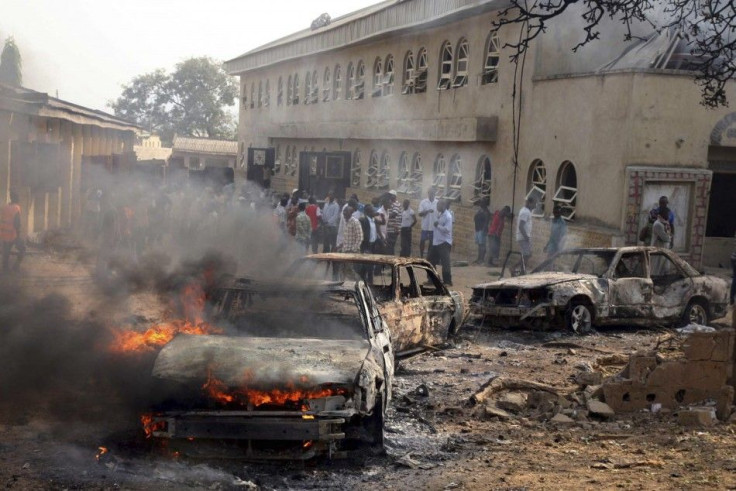Nigeria: Boko Haram Kills 36 In Easter Suicide Bombings

Nigerian rebel group Boko Haram has claimed responsibility for the Easter day bombing that killed up to three dozen people in the northern city of Kaduna.
Despite increased security in northern cities, on Sunday, a suicide bomber detonated his vehicle on a busy road in a Christian neighborhood of the predominantly Muslim city. The explosion occurred in the vicinity of two churches -- one of which was the alleged target -- drawing comparisons to the Christmas day bombings in Abuja, when Boko Haram killed more than 50 people by attacking a number of churches around the capital city during mass.
“The blast shattered windows of nearby churches and business premises. Many vehicles were also destroyed. It was a big bomb because it created a huge hole in the ground,” Kaduna resident Malam Zakari told the Nigerian Tribune.
According to AllAfrica, at least 20 of the 36 killed were achaba riders, or taxi-bike drivers who were enjoying breakfast at a local cafe.
Boko Haram is an Islamic insurgency that has terrorized Nigeria for the past year. Based in the city of Kano, the group's stated aim is to turn Nigeria into a sharia state, although there are deeper political, religious and economic divisions entangled in the rebels' battle against the government. Nigeria is a split nation -- while most of its citizens live on less than $1 per day, the Muslim north, where Boko Haram carries out the bulk of its attacks, is in general poorer than the Christian south, where the nation's oil wealth is produced. That rift, combined with rampant institutional corruption, is as much to blame for the violence as ideological differences are, according to West Africa scholar Jim Saunders.
President Goodluck Jonathan has tried to combat the insurgency by force, so far with little success. He created the Joint Task Force and Operation Restore Order -- a coalition between the military, state police and government agencies -- last June, but despite a few important arrests, the JTF has been criticized for adding to the violence rather than stopping it. Jonathan has also tried to deal with the threat diplomatically, but planned negotiations collapsed before than could even begin. The Nigerian president continues to downplay Boko Haram's efforts.
In terms of security challenges, we have some parts of the country where we have terrorist attacks, but it does not affect the whole country. We are in reasonable control, Jonathan said from the nuclear summit in Seoul, South Korea last week.
President Barack Obama is expected to address the Boko Haram issue on Monday during an event at the Center for Strategic and International Studies in Washington following a speech by U.S. Assistant Secretary of State for African Affairs Johnnie Carson, titled Nigeria, One Year After Elections.
Boko Haram has been active since 2009, but its violence and attacks began to crescendo after Nigeria's presidential elections in April 2011. Because of a long-standing informal agreement, the presidency is supposed to rotate between a northern Muslim and a southern Christian each term, but the order was up for debate last year because President Umaru Yar'Adua died in office in 2010 and the Christian Jonathan took over. So when Jonathan was re-elected, albeit for his first full term, the north was largely dissatisfied and around 800 people died during riots and political violence immediately following the vote.
Since then, Boko Haram has stepped up its militancy. In recent months, attacks are near-daily in northern states, and both official and civilian locations are targeted. Along with the Easter bombings, in the past week Boko Haram has engaged in multiple shootouts with police, shot nine people to death in a market, robbed a bank and planted roadside bombs.
However, the structure of Boko Haram is still opaque and some, like the former U.S. Ambassador to Nigeria John Campbell, suggest that the label Boko Haram is simply an umbrella term given to a series of poorly connected and poorly led gangs. Johnnie Carson has also testified before the a House of Representatives Sub-Committee that Boko Haram is not organized enough to be put on the official list of Foreign Terrorist Organizations, despite rumored links with al Qaeda.
© Copyright IBTimes 2024. All rights reserved.











